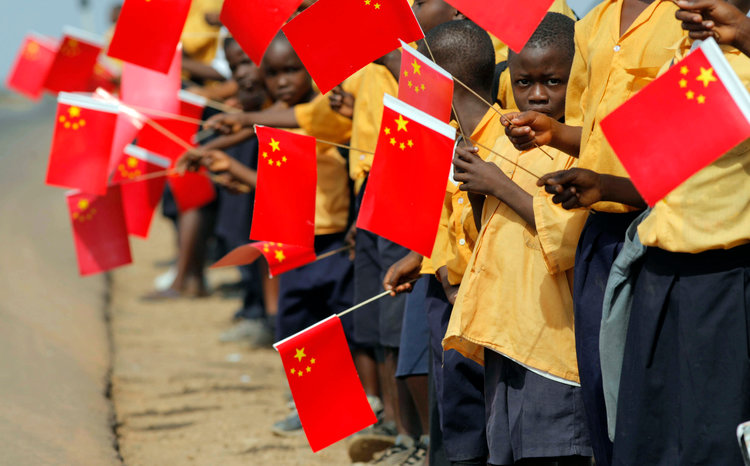President Xi Jinping told African leaders Monday that China's investments on the continent have "no political strings attached", pledging $60 billion in new development financing, even as Beijing is increasingly criticised over its debt-heavy projects abroad.
Xi offered the funding at the start of a two-day China-Africa summit that focused on his cherished Belt and Road initiative. The money -- to be spent over the next three years -- comes on top of $60 billion Beijing offered in 2015.
The massive scheme is aimed at improving Chinese access to foreign markets and resources, and boosting Beijing's influence abroad.
It has already seen China loan billions of dollars to countries in Asia and Africa for roads, railways, ports and other major infrastructure projects.
But critics warn that the Chinese leader's pet project is burying some countries under massive debt.
"China's investment in Africa comes with no political strings attached," Xi told a high-level dialogue with African leaders and business representatives ahead of the summit.
"China's cooperation with Africa is clearly targeted at the major bottlenecks to development. Resources for our cooperation are not to be spent on any vanity projects, but in places where they count the most."
But Xi admitted there was a need to look at the commercial viability of projects and make sure preparations are made to lower investment risks and make cooperation "more sustainable".
Belt and Road, Xi said, "is not a scheme to form an exclusive club or bloc against others. Rather it is about greater openness, sharing and mutual benefit."
Later, at the start of the Forum on China-Africa Cooperation (FOCAC), Xi announced $60 billion in funds for eight initiatives over the next three years, in areas ranging from industrial promotion, infrastructure construction and scholarships for young Africans.
He added that Africa's least developed, heavily indebted and poor countries will be exempt from debt they have incurred in the form of interest-free Chinese loans due to mature by the end of 2018.
A study by the Center for Global Development, a US think-tank, found "serious concerns" about the sustainability of sovereign debt in eight Asian, European and African countries receiving Belt and Road funds.
South African President Cyril Ramaphosa defended China's involvement on the continent, saying FOCAC "refutes the view that a new colonialism is taking hold in Africa as our detractors would have us believe."
During a visit to China last month, Malaysian prime minister Mahathir Mohamed warned against "a new version of colonialism," as he cancelled a series of Chinese-backed infrastructure projects worth $22 billion.
Ahead of FOCAC, Rwandan President Paul Kagame, currently the chair of the African Union, also dismissed the concerns, telling the official Xinhua news agency talk of "debt traps" were attempts to discourage African-Chinese interactions.
- 'Fractured world' -
At the last three-yearly gathering in Johannesburg in 2015, Xi announced $60 billion of assistance and loans for Africa.
Nations across Africa are hoping that China's enthusiasm for infrastructure investment will help promote industrialisation on the continent.
Nigerian President Muhammadu Buhari will oversee the signing of a telecommunication infrastructure deal backed by a $328-million loan facility from China's Exim bank during his visit, his office said.
Xi said Belt and Road complies with international norms, and China "welcomes the participation of other capable and willing countries for mutually beneficial third-party cooperation".
China has provided aid to Africa since the Cold War, but Beijing's presence in the region has grown exponentially with its emergence as a global trading power.
Chinese state-owned companies have aggressively pursued large investments in Africa, whose vast resources have helped fuel China's transformation into an economic powerhouse.
- Debt fears -
While relations between China and African nations are broadly positive, concerns have intensified about the impact of some of China's deals in the region.
Djibouti has become heavily dependent on Chinese financing after China opened its first overseas military base in the Horn of Africa country last year, a powerful signal of the continent's strategic importance to Beijing.
Locals in other countries have complained about the practice of using Chinese labour for building projects and what are perceived as sweetheart deals for Chinese companies.
The concerns are likely to grow as countries in other parts of the world -- especially Southeast Asia -- begin to question whether Chinese aid comes at too high a price.
"Time has come for African leaders to critically interrogate their relationship with China," an editorial in Kenya's Daily Nation said Monday.
African leaders, "should use the summit to ask tough questions. What are the benefits in this relationship? Is China unfairly exploiting Africa like the others before it?" - AFP




